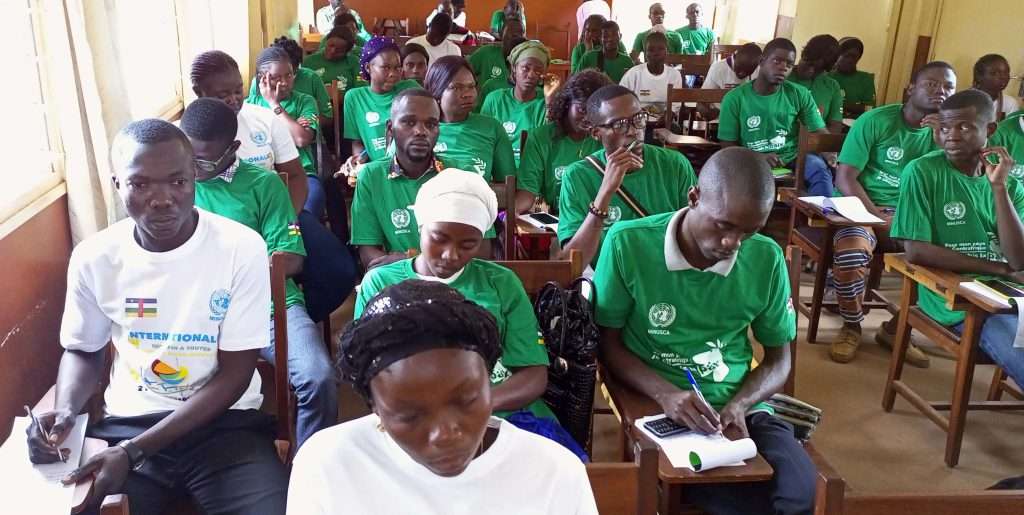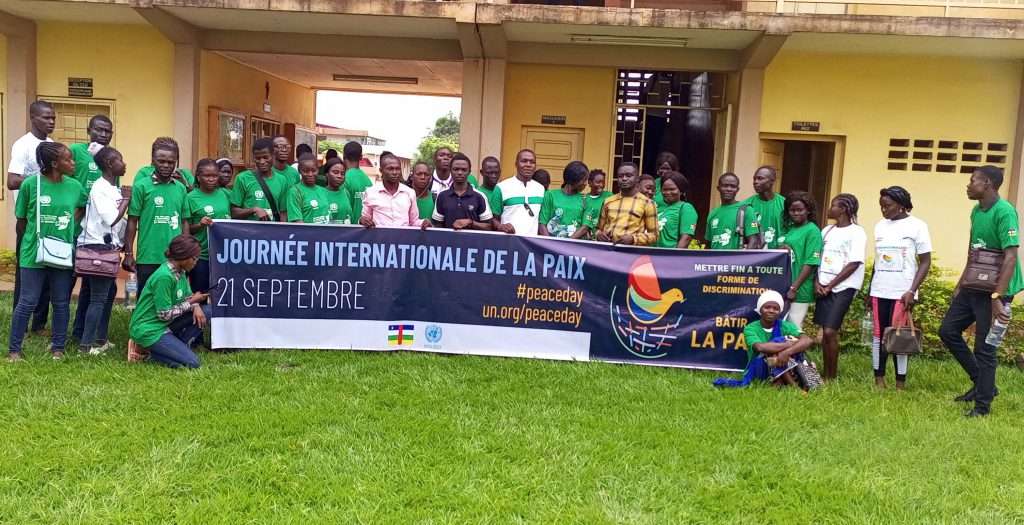As part of the activities of the delayed commemoration of the International Day of Peace (IDD 2022), the day of October 09, 2022 from 8 a.m. to 2 p.m. was devoted to an educational talk with 50 students from the Student Associations of the Center Catholique Universitaire. These are the Peer Educators of the CIEE-CCU, the Peace Volunteers and some students from the Catholic Student Youth (JEC). This activity was made possible thanks to the multifaceted support of the United Nations Multidimensional Integrated Support Mission in the Central African Republic (MINUSCA).
The Event that happened at Center Catholique Universitaire (CCU), in Bangui, Central African Republic started off with a discussion session that was opened by the CIEE-CCU coordinator who welcomed the participants and the mobilization of young people. He invited them to take advantage of this framework for exchanges so that it is not just a pastime, but a place of contribution to the building of lasting peace in the CAR. He rightly pointed out that the objective of the talk is to mobilize young people around the fight against different forms of discrimination, hate speech and misinformation. Knowing how to identify forms of discrimination, hate speech and making a commitment not to be an easy sieve of unenlightened opinions is an already won fight on a personal level before having to play the role of being an educator of conscience in the different social backgrounds.

The first part of the educational talk was moderated by Mr. Delphin KPATA GBIGBI, expert in Conflict Analysis and Resolution around the theme “Banishing forms of discrimination against pupils and students: what solutions are envisaged to fight against hate and misinformation in communities? “. He began by presenting the different forms of discrimination faced by young people in their living environment. Then he made the link between these different forms of discrimination and hate speech before proposing solutions to fight against these scourges. Using an interactive and dynamic method, participants were able to work in small groups on sub-themes. A few answers to the questions raised by one or the other presentation allowed the facilitator to raise gray areas. At the end of his presentation, the facilitator challenged the participants to take concrete actions to change the mentalities of their young peers.
The second part of the activity was led by the coordinator of the CIEE-CCU, Mr. Charles SOMDA around the theme “civility and citizenship in schools and students: the case of students from CCU associations”. A brief presentation of the history of the CIEE-CCU provided context for the intervention. The mission of the CIEE-CCU is focused on education, supervision, training, support for young people in general and students from the University of Bangui and higher institutes, high schools in the city of Bangui. At the heart of its activities is the concern for awakening civic awareness and moral behavior capable of contributing to the construction of real social well-being.

Beyond the technical definitions of the terms civics and citizenship, the facilitator showed that there is an intrinsic link between them. If citizenship is understood as the fact of being from a city, it comes under the identity and belonging to an environment “a city” which gives the right to privileges and duties, civic-mindedness is order to know how to be with others in the city. Citizenship touches on a dimension of behavior and laudable attitudes of the citizen. Civics and citizenship refer to an awareness, a sense of pride and belonging to a social environment that encourages an exemplary commitment to improving my society and the lives of my fellow citizens.
To be a citizen, therefore, it is not necessary to limit oneself to questions of civil documents, but one must consider the degree of attachment to the city which makes one behave well there by contributing to the good of one’s fellow citizens. A civic citizen should not tolerate discrimination in any form. It always rises up against any potential hate speech tones of expectation of violent conflicts undermining social cohesion. A good citizen is careful in his relationship to information and opinions, since he or she is aware of the danger of misinformation. Citizenship gives us an identity and civic-mindedness confirms us in this identity through the attachment and dedication we have for the good of our city.
The facilitator gradually led the participants to a kind of self-assessment to see to what degree they are citizens and civics in their daily lives. He insisted on love of country as the starting point of good citizenship. Citizenship is a key element for the development of any country. It becomes reality when there is real personal transformation. With personal transformation it marks the starting point for qualitative social change. Practical exercises to be done on a daily basis were given to the participants to contribute on an individual level to the building of healthy social relations where all men are respected in their dignity. Each participant was invited to strive on a daily basis to;
- Stop criticising and hurting others
- Take a sincere interest in others
- Smile so as to communicate joy
- Have a sense of careful listening
By,
Evince PENDABERY and Charles SOMDA SJ, CIEE,
